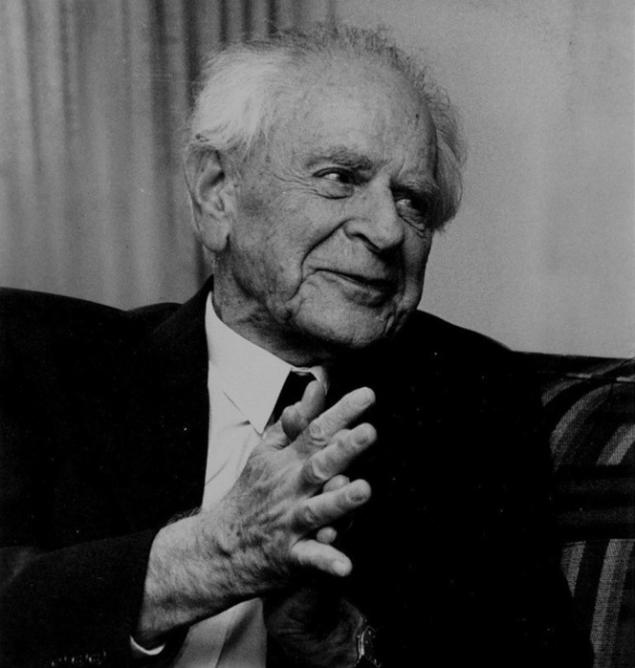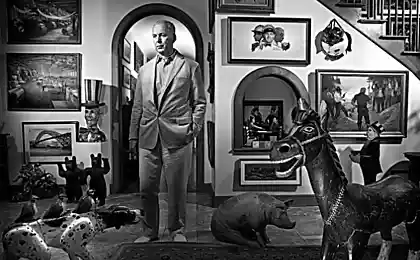625
Popper's falsifiability as a scientific criterion
To deny in our world, albeit not all, but very, very much. And that's something even the most seemingly unshakable was called into question, it only takes one to refute something that is fact. This is what reads the criterion of empirical theory, called the falsifiability.
The presented criterion was formulated in 1935 by Austrian and British philosopher and sociologist Karl Raimund Popper. Any theory can be falsifiable and therefore scientific if it can be refuted through a statement of any experiment even if such an experiment has not been realized.

According to the falsifiability of the system of statements or individual statements can contain information about the empirical world only when they have the ability to deal with real-world experience, in other words, if they can systematically be inspected, i.e., to be checked, which can be rebutted. Based on the criterion of Popper, no scientific theory can not be 100% conclusive, and, drawing on this, it becomes possible to separate scientific knowledge from unscientific. In fact, falsifiability is a necessary condition of scientificity of any theory or assertion.
All this sounds somewhat complicated, but let's try to understand what it all means.
The essence of falsifiability
Any number of facts that confirm the reliability of any statements obtained through reasoning from the particular to the General, says only that this statement is only highly likely, but not certain. And it may be enough just one are able to refute the fact that the arguments have been discarded as useless. Such qualitative characteristics of refuting and confirming factors like "role" and "power" in the process of establishing the truth and meaning of scientific hypotheses and theories received the name of "informative asymmetry".
This is the cognitive asymmetry was the basis of the replacement principle of verification, which is a positive initiative test or, in more simple words, a confirmation. The principle of verification, which initially proclaimed logical empirist, was replaced by the principle of falsification, which, in turn, has a positive feasible retraction. The principle of falsification says that to check the scientific meaning and accuracy of scientific theories need not search through facts, but through the search of facts to refute.
Falsifiability requires that hypotheses or theory was fundamentally irrefutable. According to Popper, a theory cannot be considered scientific, guided only by the fact that there is one or a set of experiments that speak about its reliability. Given the fact that almost all the theories that are created on the basis of experimental data, allow the possibility of implementing more experiments to confirm the presence of this evidence cannot be considered to be an indicator of scientific theories.
In addition, according to the philosopher, the theory may be different in relation to the possibility of conducting experiments that can, at least theoretically, give the results, disproving these theories. Theories suggesting that such a possibility can take place, is called falsifiable.
A theory for which such opportunities are not available, i.e. the theory within which it is possible to explain any results of any conceivable experiments are called nepaliforum.
Will not be superfluous to say that falsifiability is the only criterion, allowing to relate the theory to the category of science, however, is not a criterion indicating its validity or the possibility of its successful implementation.
Popper's criterion and the truth of theories can relate to each other differently. In the case when refuting the theory falsifiable experiment with its setting gives results that are inconsistent with the theory, the theory can be considered falsified, but it does not mean that it is not falsifiable, i.e. it remains scientific.
Taking into account that criterion, usually referred to as a necessary and sufficient condition, falsifiability, despite the fact that it is called the criterion, is only a necessary, but not sufficient characteristic of a scientific theory.
Philosophy of science and scientific knowledge are based on two fundamental ideas.The first idea says that scientific knowledge can provide, and provides people the truth, and the second says that scientific knowledge frees people from prejudice and misconceptions. The first of these ideas were discarded by Karl Raimund Popper, and the second became the basis of his methodology.
In 30-50-ies of XX century, Popper attempted to strictly distinguish between science and metaphysics, based on the principles of falsifiability, but after some time changed their views, recognizing the fact that the difference between science and metaphysics, which he had proposed initially, it was formal. But falsifiability is still used in the scientific world.

The use of falsifiability
Today in science falsifiability as a scientific criterion is used quite widely, although not very strictly. This is mainly when it comes to establishing the falsity of any scientific hypothesis or theory. And there are theories that continue to apply, despite the fact that found out to refute their facts, i.e. the theory is falsified. They continue to apply if the bulk of facts with regards to them, is proving a more advanced similar theories have not yet been created, or if other options neudobopriemlemyh.
The reasons why it is so, there are the following:
First, some experiments, which provide refuting the theory of the results can be considered an indicator not of what this theory is about, and that is too widely defined area where it is applied.
For example, experiments with physical objects that move at speeds close to the speed of light, on the one hand falsifiziert postulates of classical mechanics, but in fact are simply outside the domain of applicability of this theory, and therefore, they should be considered in terms of a more generalized theory of relativity.
Or facts indicating the self-organization of matter, which examines the thermodynamics of nonequilibrium processes – they are not falsifying the thermodynamics at all, because its laws, to break in non-equilibrium processes defined for other conditions.
Moreover, to reject the overall thermodynamics or classical mechanics to anyone and does not occur. It's just that the use of both is limited to those areas where they work.
As for the second reason, of practical scientific activities are not immune from mistakes, wrong interpretations, biased opinions and that also is not uncommon, deliberate fraud. On this basis, new facts are always evaluated with reference to the amount of refuting their material previously obtained, and the reliability of sources of information and the possibility that the results may be interpreted incorrectly.
For example, if a person sees a stone, which rises into the sky, he will most likely questioning what they saw or think that his play, rather than doubt the law of gravity.
So when there are facts that, at first glance, falsifiziert properly tested the theory, originally imposed the assumption that the experiment was incorrect. And only the accumulation of enough volume of facts that cast doubt on such a theory, it makes sense to start the conversation about to abandon it or revise.
But I would like to note that, the basic premise of falsifiability, whereby irrefutable theory cannot be considered scientific, members of the academic world share fully and accurately adhere to it.
Also interesting: a 45-year study of success in life, geeks
Quantum psychology: WHAT we create unconsciously
Popper's criterion also can be used by you – it is very you may need, for example, in the work on the selection of sources of information for coursework or research papers, dissertations and doctoral, and can also provide invaluable support in the process of self-education. published
Author: Kirill Nogales
P. S. And remember, only by changing their consumption — together we change the world! ©
Source: 4brain.ru/blog/%D1%84%D0%B0%D0%BB%D1%8C%D1%81%D0%B8%D1%84%D0%B8%D1%86%D0%B8%D1%80%D1%83%D0%B5%D0%BC%D0%BE%D1%81%D1%82%D1%8C-%D0%BF%D0%BE%D0%BF%D0%BF%D0%B5%D1%80%D0%B0/
The presented criterion was formulated in 1935 by Austrian and British philosopher and sociologist Karl Raimund Popper. Any theory can be falsifiable and therefore scientific if it can be refuted through a statement of any experiment even if such an experiment has not been realized.

According to the falsifiability of the system of statements or individual statements can contain information about the empirical world only when they have the ability to deal with real-world experience, in other words, if they can systematically be inspected, i.e., to be checked, which can be rebutted. Based on the criterion of Popper, no scientific theory can not be 100% conclusive, and, drawing on this, it becomes possible to separate scientific knowledge from unscientific. In fact, falsifiability is a necessary condition of scientificity of any theory or assertion.
All this sounds somewhat complicated, but let's try to understand what it all means.
The essence of falsifiability
Any number of facts that confirm the reliability of any statements obtained through reasoning from the particular to the General, says only that this statement is only highly likely, but not certain. And it may be enough just one are able to refute the fact that the arguments have been discarded as useless. Such qualitative characteristics of refuting and confirming factors like "role" and "power" in the process of establishing the truth and meaning of scientific hypotheses and theories received the name of "informative asymmetry".
This is the cognitive asymmetry was the basis of the replacement principle of verification, which is a positive initiative test or, in more simple words, a confirmation. The principle of verification, which initially proclaimed logical empirist, was replaced by the principle of falsification, which, in turn, has a positive feasible retraction. The principle of falsification says that to check the scientific meaning and accuracy of scientific theories need not search through facts, but through the search of facts to refute.
Falsifiability requires that hypotheses or theory was fundamentally irrefutable. According to Popper, a theory cannot be considered scientific, guided only by the fact that there is one or a set of experiments that speak about its reliability. Given the fact that almost all the theories that are created on the basis of experimental data, allow the possibility of implementing more experiments to confirm the presence of this evidence cannot be considered to be an indicator of scientific theories.
In addition, according to the philosopher, the theory may be different in relation to the possibility of conducting experiments that can, at least theoretically, give the results, disproving these theories. Theories suggesting that such a possibility can take place, is called falsifiable.
A theory for which such opportunities are not available, i.e. the theory within which it is possible to explain any results of any conceivable experiments are called nepaliforum.
Will not be superfluous to say that falsifiability is the only criterion, allowing to relate the theory to the category of science, however, is not a criterion indicating its validity or the possibility of its successful implementation.
Popper's criterion and the truth of theories can relate to each other differently. In the case when refuting the theory falsifiable experiment with its setting gives results that are inconsistent with the theory, the theory can be considered falsified, but it does not mean that it is not falsifiable, i.e. it remains scientific.
Taking into account that criterion, usually referred to as a necessary and sufficient condition, falsifiability, despite the fact that it is called the criterion, is only a necessary, but not sufficient characteristic of a scientific theory.
Philosophy of science and scientific knowledge are based on two fundamental ideas.The first idea says that scientific knowledge can provide, and provides people the truth, and the second says that scientific knowledge frees people from prejudice and misconceptions. The first of these ideas were discarded by Karl Raimund Popper, and the second became the basis of his methodology.
In 30-50-ies of XX century, Popper attempted to strictly distinguish between science and metaphysics, based on the principles of falsifiability, but after some time changed their views, recognizing the fact that the difference between science and metaphysics, which he had proposed initially, it was formal. But falsifiability is still used in the scientific world.

The use of falsifiability
Today in science falsifiability as a scientific criterion is used quite widely, although not very strictly. This is mainly when it comes to establishing the falsity of any scientific hypothesis or theory. And there are theories that continue to apply, despite the fact that found out to refute their facts, i.e. the theory is falsified. They continue to apply if the bulk of facts with regards to them, is proving a more advanced similar theories have not yet been created, or if other options neudobopriemlemyh.
The reasons why it is so, there are the following:
First, some experiments, which provide refuting the theory of the results can be considered an indicator not of what this theory is about, and that is too widely defined area where it is applied.
For example, experiments with physical objects that move at speeds close to the speed of light, on the one hand falsifiziert postulates of classical mechanics, but in fact are simply outside the domain of applicability of this theory, and therefore, they should be considered in terms of a more generalized theory of relativity.
Or facts indicating the self-organization of matter, which examines the thermodynamics of nonequilibrium processes – they are not falsifying the thermodynamics at all, because its laws, to break in non-equilibrium processes defined for other conditions.
Moreover, to reject the overall thermodynamics or classical mechanics to anyone and does not occur. It's just that the use of both is limited to those areas where they work.
As for the second reason, of practical scientific activities are not immune from mistakes, wrong interpretations, biased opinions and that also is not uncommon, deliberate fraud. On this basis, new facts are always evaluated with reference to the amount of refuting their material previously obtained, and the reliability of sources of information and the possibility that the results may be interpreted incorrectly.
For example, if a person sees a stone, which rises into the sky, he will most likely questioning what they saw or think that his play, rather than doubt the law of gravity.
So when there are facts that, at first glance, falsifiziert properly tested the theory, originally imposed the assumption that the experiment was incorrect. And only the accumulation of enough volume of facts that cast doubt on such a theory, it makes sense to start the conversation about to abandon it or revise.
But I would like to note that, the basic premise of falsifiability, whereby irrefutable theory cannot be considered scientific, members of the academic world share fully and accurately adhere to it.
Also interesting: a 45-year study of success in life, geeks
Quantum psychology: WHAT we create unconsciously
Popper's criterion also can be used by you – it is very you may need, for example, in the work on the selection of sources of information for coursework or research papers, dissertations and doctoral, and can also provide invaluable support in the process of self-education. published
Author: Kirill Nogales
P. S. And remember, only by changing their consumption — together we change the world! ©
Source: 4brain.ru/blog/%D1%84%D0%B0%D0%BB%D1%8C%D1%81%D0%B8%D1%84%D0%B8%D1%86%D0%B8%D1%80%D1%83%D0%B5%D0%BC%D0%BE%D1%81%D1%82%D1%8C-%D0%BF%D0%BE%D0%BF%D0%BF%D0%B5%D1%80%D0%B0/























